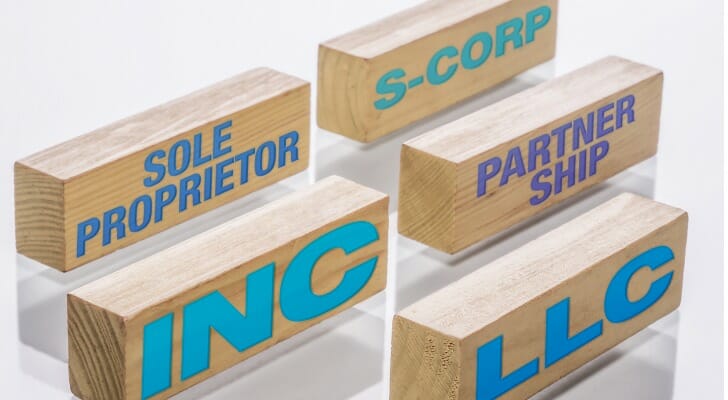 One of the most important decisions when starting a business is the business structure. The choice of business entity significantly affects matters like liability, taxes, control, financing and regulation, according to the Small Business Administration. While it’s possible to change the business structure after founding a company, doing so could have unintended tax consequences and even require the business to be dissolved. That’s just one of the reasons choosing a business structure is something that should be carefully considered, with the help of expert financial advisors.
One of the most important decisions when starting a business is the business structure. The choice of business entity significantly affects matters like liability, taxes, control, financing and regulation, according to the Small Business Administration. While it’s possible to change the business structure after founding a company, doing so could have unintended tax consequences and even require the business to be dissolved. That’s just one of the reasons choosing a business structure is something that should be carefully considered, with the help of expert financial advisors.
Electing a business structure is done when registering a business with the state. The choice of business structure will affect paperwork, fees and other requirements. When registering, the business will also normally get a tax ID number and apply for any permits and licenses that the state requires.
Business Structure Issues
Legal liability is a key consideration driving business structure choice. With the simplest structures, such as sole proprietorship, the owner is personally liable for any obligations of the business. More complex structures, such as corporations, shield owners from having to fulfill debts or other obligations incurred by the business.
Tax matters are also central to this decision. Partnerships, sole proprietors and some other structures pay no income taxes, instead passing profits directly through to owners, who report the taxable income on their personal tax returns. Corporations, on the other hand, are separate legal entities that file their own tax returns. As a result, dividends paid to a corporation’s owners are taxed twice, on the corporation’s return and again on the owners’ individual tax returns.
Simple structures like proprietorships, have simple control setups – the owner makes all decisions. Corporations, however, require establishing a board of directors that can weigh in on matters of strategy and policy. Founders that use more complex structures have to share authority.
Structure also affects availability of financing. Investors and lenders prefer corporations over sole proprietors and partnerships. Corporations can raise money by selling partial ownership in the form of shares, and the liability shield protects shareholders against the risk of losing personal assets to satisfy business debts.
Simple structures such as partnerships and sole proprietors require the least paperwork and are subject to the least regulation. Corporations and limited liability companies (LLCs) have to file articles of incorporation with state secretaries of state and submit annual reports, adding complexity and expense.
Business Structure Types
Sole proprietorship – The sole proprietorship is the simplest and most common business structure. When a single individual starts a business without partners, the sole proprietorship is the default structure. Sole proprietors have complete control of the business, but also have complete personal liability for any debts the business incurs. The profits from a sole proprietorship are only taxed when reported as income on the owner’s individual tax return.
 Partnership – When two or more people jointly invest money, effort or other resources to start a business, the simplest structure is the partnership. Like sole proprietors, partners have unlimited personal liability for the obligations of the business, unless the partnership is structured as a limited partnership or limited liability partnership. A limited partnership has a general partner with unlimited liability as well as limited partners who have restricted personal liability. A limited liability partnership shields all owners from liability for debts of the business as well as actions of the other partners. Partnerships file income tax returns, but profits pass through directly to owners, who report them on their personal returns and pay taxes at their individual rates.
Partnership – When two or more people jointly invest money, effort or other resources to start a business, the simplest structure is the partnership. Like sole proprietors, partners have unlimited personal liability for the obligations of the business, unless the partnership is structured as a limited partnership or limited liability partnership. A limited partnership has a general partner with unlimited liability as well as limited partners who have restricted personal liability. A limited liability partnership shields all owners from liability for debts of the business as well as actions of the other partners. Partnerships file income tax returns, but profits pass through directly to owners, who report them on their personal returns and pay taxes at their individual rates.
Limited liability company – An LLC has some traits of a partnership and some of a corporation. LLC owners, like corporate shareholders, are shielded from most liability for business actions. Like partnerships, LLCs don’t pay taxes directly, instead passing profits through to the owners, who report them as income on their individual returns. This avoids double taxation.
Corporation – Also known as a C corporation or regular corporation, a corporation are formed when stockholders pay to acquire shares representing ownership in the corporation. Corporations are separate legal entities that file their own tax returns and pay taxes at the corporate rate. Double taxation occurs when corporations distribute profits to shareholders as dividends and the shareholders pay taxes on the income again. Shareholders are not personally liable for the corporation’s debts or other obligations. The corporate structure is used by large public companies but most corporations are closely held private companies.
S corporation – This is a corporation that has been granted a special status by the Internal Revenue Service that lets profits pass through directly to the owners, rather than being taxed twice at the corporate and individual levels. S corporations, or S corps, have some restrictions, including a maximum of 100 shareholders.
The Bottom Line
 Choosing a business structure is an important initial step in setting up a business. The choice of structure affects many aspects of business operation, including personal liability of the owners and how federal income taxes will be paid.
Choosing a business structure is an important initial step in setting up a business. The choice of structure affects many aspects of business operation, including personal liability of the owners and how federal income taxes will be paid.
Long-term, some structures can help or hinder the business’s ability to raise money and expand.
Tips for Business Owners
- Before deciding on the business structure for a new enterprise, consider working with an experienced financial advisor. If you don’t have a financial advisor yet, finding one doesn’t have to be hard. SmartAsset’s free tool matches you with up to three vetted financial advisors who serve your area, and you can interview your advisor matches at no cost to decide which one is right for you. If you’re ready to find an advisor who can help you achieve your financial goals, get started now.
- The complexity of business taxation means almost any business would do well to get expert help. A tax accountant may charge several hundred dollars an hour for customized planning. However, a much less expensive, off-the-shelf tax return preparation software, can run what-if scenarios for business owners interested in do-it-yourself tax planning.
Photo credit: ©iStock.com/porcorex, ©iStock.com/martin-dm, ©iStock.com/mmg1design